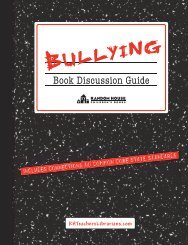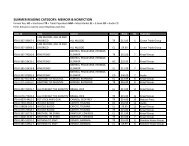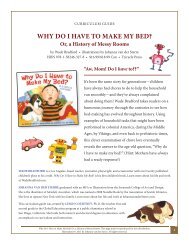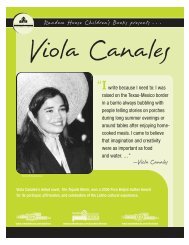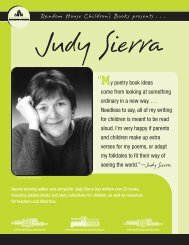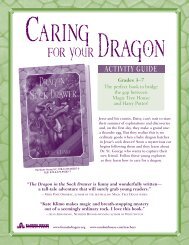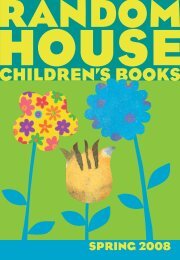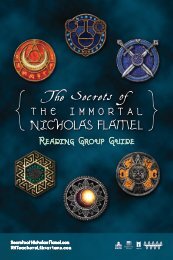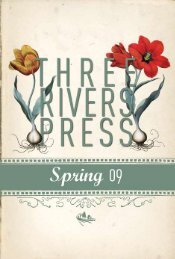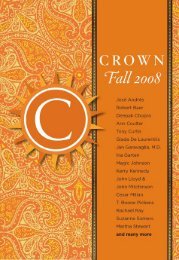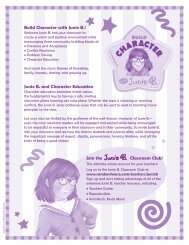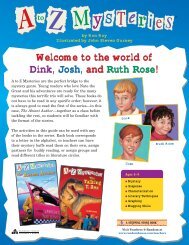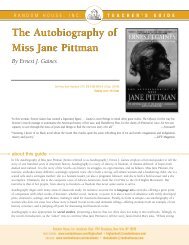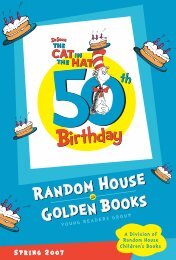to download the Teacher's Guide PDF - Random House
to download the Teacher's Guide PDF - Random House
to download the Teacher's Guide PDF - Random House
Create successful ePaper yourself
Turn your PDF publications into a flip-book with our unique Google optimized e-Paper software.
NOVELS<br />
IN VERSE<br />
Exposed<br />
Kimberly Marcus<br />
Sixteen-year-old Liz is Pho<strong>to</strong>girl—<br />
sharp, focused, and confident in<br />
what she sees through her camera<br />
lens. Confident that she and Kate<br />
will be best friends forever.<br />
But everything changes in one<br />
blurry night.<br />
Grades 7 up<br />
HC: 978-0-375-86693-7 • GLB: 978-0-375-96693-4<br />
Ebook: 978-0-375-89724-5<br />
Kaleidoscope Eyes<br />
Jen Bryant<br />
In a tale inspired by a true s<strong>to</strong>ry<br />
of buried treasure, Jen Bryant<br />
weaves an emotional and<br />
suspenseful novel in poems, all<br />
set against <strong>the</strong> backdrop of <strong>the</strong><br />
Vietnam War during a pivotal<br />
year in U.S. his<strong>to</strong>ry.<br />
Grades 4–7<br />
PB: 978-0-440-42190-0<br />
HC: 978-0-375-84048-7 • GLB: 978-0-375-94048-4<br />
Ebook : 978-0-375-85365-4<br />
Visit Teachers @ <strong>Random</strong> at www.randomhouse.com/teachers<br />
Orchards<br />
Holly Thompson<br />
After a classmate commits suicide,<br />
Kana Goldberg—a half-Japanese,<br />
half-Jewish American—wonders who<br />
is responsible. She and her cliquey<br />
friends said some thoughtless things<br />
<strong>to</strong> <strong>the</strong> girl. Hoping that Kana will<br />
reflect on her behavior, her parents<br />
pack her off <strong>to</strong> her mo<strong>the</strong>r’s ancestral<br />
home in Japan for <strong>the</strong> summer.<br />
Grades 7 up<br />
HC: 978-0-385-73977-1 • GLB: 978-0-385-90806-1<br />
Ebook : 978-0-375-89834-1<br />
Three Rivers Rising:<br />
A Novel of <strong>the</strong> Johns<strong>to</strong>wn Flood<br />
Jame Richards<br />
This searing novel in poems explores<br />
a cross-class romance—and a tragic<br />
event in U.S. his<strong>to</strong>ry when a dam<br />
fails, unleashing 20 million <strong>to</strong>ns of<br />
water on<strong>to</strong> Johns<strong>to</strong>wn, Pennsylvania,<br />
in <strong>the</strong> valley below.<br />
Grades 7 up<br />
HC: 978-0-375-85885-7 • GLB: 978-0-375-95885-4<br />
Ebook : 978-0-375-89553-1<br />
Your Own, Sylvia:<br />
A Verse Portrait of Sylvia Plath<br />
Stephanie Hemphill<br />
On a bleak February day in 1963,<br />
a young American poet died by her<br />
own hand, and passed in<strong>to</strong> a myth<br />
that has since imprinted itself on<br />
<strong>the</strong> hearts and minds of millions.<br />
She was and is Sylvia Plath and<br />
Your Own, Sylvia is a portrait of her<br />
life, <strong>to</strong>ld in poems.<br />
Grades 9 up<br />
PB: 978-0-440-23968-0<br />
HC: 978-0-375-83799-9 • GLB: 978-0-375-93799-6<br />
Ebook : 978-0-307-49359-0
TEACHING NOVELS IN VERSE<br />
Jump-rope rhymes, Mo<strong>the</strong>r Goose rhymes,<br />
<strong>the</strong> poems of Robert Louis Stevenson,<br />
and <strong>the</strong> nonsensical verses of Jack Prelutsky<br />
are among children’s first experiences with poetry.<br />
They respond <strong>to</strong> <strong>the</strong> rhyming language, and even enjoy<br />
committing <strong>the</strong> rhymes <strong>to</strong> memory. Beyond this stage, poetry<br />
isn’t always popular with young readers. Perhaps it’s because<br />
<strong>the</strong>re is so much emphasis on reading comprehension in <strong>the</strong><br />
elementary grades that <strong>the</strong>re is little time spent on reading<br />
for meaning. Students do study figurative language in <strong>the</strong><br />
primary grades, but it is usually in <strong>the</strong> context of prose.<br />
By <strong>the</strong> time <strong>the</strong>y enter middle and high school, <strong>the</strong>y have<br />
had very little experience reading poetry, and almost no<br />
practice analyzing it. For this reason, students often groan at<br />
<strong>the</strong> idea of a poetry unit. Poetry is difficult for many students<br />
because it forces <strong>the</strong>m <strong>to</strong> use all senses, <strong>to</strong> read between <strong>the</strong><br />
lines, and <strong>to</strong> think in an abstract way. However, some<br />
instinctively have great insight in<strong>to</strong> <strong>the</strong> symbolic language<br />
of poetry and welcome <strong>the</strong> opportunity <strong>to</strong> analyze, interpret,<br />
and even apply it <strong>to</strong> <strong>the</strong>ir own lives.<br />
The relatively new trend of “novels in verse” opens up a<br />
new reading experience for students. All of <strong>the</strong> elements of<br />
s<strong>to</strong>ry are <strong>the</strong>re for <strong>the</strong>m <strong>to</strong> embrace. Yet, <strong>the</strong> poetic form<br />
in which <strong>the</strong>se novels are written calls upon <strong>the</strong> reader <strong>to</strong><br />
PRE-READING ACTIVITY<br />
participate in a much more intimate way than when <strong>the</strong>y are<br />
reading prose. For example, young adults who are struggling<br />
with <strong>the</strong> poetry of Sylvia Plath may find great insight in<strong>to</strong><br />
her work by reading Your Own, Sylvia: A Verse Portrait of<br />
Sylvia Plath. This sketch of her life, written in eloquent verse<br />
by Stephanie Hemphill, may be read side-by-side with Plath’s<br />
works <strong>to</strong> give students <strong>the</strong> ultimate poetry experience. There<br />
are novels in verse that deal with his<strong>to</strong>rical events like <strong>the</strong><br />
Johns<strong>to</strong>wn Flood of 1889 and <strong>the</strong> 1925 Scopes Trial. These<br />
novels allow readers moment-by-moment views through <strong>the</strong><br />
eyes of a number of characters, fictional and real, that were<br />
personally involved in <strong>the</strong> events. Then <strong>the</strong>re are novels in<br />
verse that deal with adolescent concerns of love and loss,<br />
courage and despair, and dreams—haunted and unfulfilled.<br />
Using novels in verse with young adults is an excellent<br />
prelude <strong>to</strong> <strong>the</strong> study of traditional poetry. Once students<br />
are comfortable with <strong>the</strong> free verse form that appeals<br />
<strong>to</strong> <strong>the</strong>ir own senses, <strong>the</strong>n <strong>the</strong>y are more ready <strong>to</strong> explore<br />
<strong>the</strong> language of more conventional styles of poetry.<br />
Discuss <strong>the</strong> following types of poetry: ballad, blues, elegy, & ode. Then have students use sites on <strong>the</strong> Internet or books<br />
in <strong>the</strong> library <strong>to</strong> locate examples of <strong>the</strong>se types of poetry. Have an “open mic” session where students read <strong>the</strong> poems<br />
that <strong>the</strong>y found. Ask <strong>the</strong>m <strong>to</strong> introduce each poem by giving background information on <strong>the</strong> poet, and a summary of<br />
<strong>the</strong> s<strong>to</strong>ry that poem tells. Then introduce <strong>the</strong> concept of free verse. Read examples <strong>to</strong> <strong>the</strong> class, and discuss <strong>the</strong> genre<br />
of novels in verse.<br />
Pho<strong>to</strong>graphs (clockwise from <strong>to</strong>p): © Mike Meskin;<br />
© Royalty-free/PT Images/Jupiterimages; © Royalty-free/<br />
Fancy/Jupiterimages; © Westend61 GmbH/Alamy
CLASSROOM CONNECTIONS<br />
Discuss <strong>the</strong> vocabulary of poetry. How do poets use<br />
metaphor, simile, personification, hyperbole, symbol,<br />
irony, and imagery <strong>to</strong> express new ways of looking at<br />
things beyond <strong>the</strong> literal meaning? Ask students <strong>to</strong> find<br />
examples of each of <strong>the</strong>se poetic forms of language in <strong>the</strong><br />
five novels in verse. What is symbolic about <strong>the</strong> titles<br />
Kaleidoscope Eyes, Exposed, and Orchards? Poets often use<br />
<strong>the</strong>ir art form <strong>to</strong> express what is inside each of us. How do<br />
<strong>the</strong> poets of <strong>the</strong>se five novels in verse convey emotion,<br />
passion, opinions, beauty, anger, hopes, dreams, and fears?<br />
Have students cite specific examples from <strong>the</strong> novels <strong>to</strong><br />
support <strong>the</strong>ir answers.<br />
Ask students <strong>to</strong> analyze Lyza in<br />
Kaleidoscope Eyes. How is reading <strong>the</strong><br />
novel like reading Lyza’s diary?<br />
Discuss how Jen Bryant uses poetry <strong>to</strong><br />
successfully weave all <strong>the</strong> elements<br />
of s<strong>to</strong>ry—character, setting, point of<br />
view, <strong>the</strong>me, and conflict. Explain<br />
how <strong>the</strong> buried treasure changes<br />
<strong>the</strong> lives of a number of people in<br />
this small New Jersey <strong>to</strong>wn. Divide <strong>the</strong> class<br />
in<strong>to</strong> small groups, and assign each group a section of <strong>the</strong><br />
book. Ask each group <strong>to</strong> select 8–10 poems from <strong>the</strong><br />
assigned section <strong>to</strong> perform ei<strong>the</strong>r as choral readings or<br />
as dramatic monologues. The novel is set during <strong>the</strong><br />
Vietnam War. There were many songs of that era that<br />
<strong>to</strong>ld <strong>the</strong> s<strong>to</strong>ry of war. Dixon, Malcolm’s bro<strong>the</strong>r is in<br />
Vietnam. Select music from that era <strong>to</strong> introduce each<br />
section of <strong>the</strong> book.<br />
A verse novel requires readers <strong>to</strong> use <strong>the</strong>ir imagination.<br />
Unlike prose, not all details are <strong>to</strong>ld. Readers must read<br />
between <strong>the</strong> lines, fill in <strong>the</strong> blanks, and understand that<br />
<strong>the</strong> white space is as meaningful as what is written.<br />
Sometimes <strong>the</strong> poet actually uses <strong>the</strong> white space <strong>to</strong> give<br />
<strong>the</strong> readers a moment <strong>to</strong> collect <strong>the</strong>mselves. Find specific<br />
examples in Exposed where <strong>the</strong> reader needs a moment <strong>to</strong><br />
take a breath, <strong>to</strong> be relieved of tension. Ask students <strong>to</strong><br />
discuss if <strong>the</strong>y have a hint of why Kate leaves Liz’s house<br />
on <strong>the</strong> morning of <strong>the</strong> sleepover. Explain <strong>the</strong> words of<br />
Annie Leibovitz on <strong>the</strong> last page of Exposed:<br />
When you trust your point of view,<br />
That’s when you start taking pictures.<br />
How does Liz’s point of view change from <strong>the</strong> beginning<br />
of <strong>the</strong> novel <strong>to</strong> <strong>the</strong> end? What do you think Liz says <strong>to</strong><br />
Kate on p. 254?<br />
Illustration © 2009 by CSA Images<br />
In Your Own, Sylvia,<br />
Stephanie Hemphill<br />
presents <strong>the</strong> life of Sylvia<br />
Plath in free verse. How do<br />
her notes at <strong>the</strong> end of many<br />
of <strong>the</strong> poems help <strong>the</strong> reader<br />
fur<strong>the</strong>r connect <strong>to</strong> Plath’s life? Ask students<br />
<strong>to</strong> research <strong>the</strong> life and work of one poet and<br />
<strong>the</strong>n have <strong>the</strong>m write three free verse poems<br />
that reveal a particular period in <strong>the</strong> poet’s life.<br />
Have <strong>the</strong>m make notes at <strong>the</strong> bot<strong>to</strong>m of each poem<br />
as Hemphill did in some of her poems.<br />
Three Rivers Rising: A Novel of <strong>the</strong> Johns<strong>to</strong>wn Flood deals<br />
with <strong>the</strong> 1889 Johns<strong>to</strong>wn flood. Brains<strong>to</strong>rm with <strong>the</strong> class<br />
all of <strong>the</strong> his<strong>to</strong>rical material that is presented in <strong>the</strong><br />
novel—including social cus<strong>to</strong>ms and behavior. Divide<br />
<strong>the</strong> class in<strong>to</strong> small groups and ask <strong>the</strong>m <strong>to</strong> think of an<br />
his<strong>to</strong>rical event that includes at least five different<br />
people—for example, signing of <strong>the</strong> Constitution, <strong>the</strong><br />
civil rights movement, or <strong>the</strong> women’s suffrage movement.<br />
Ask <strong>the</strong>m <strong>to</strong> use resources in <strong>the</strong> library or sites on <strong>the</strong><br />
Internet <strong>to</strong> thoroughly research <strong>the</strong> event. Then have<br />
each group write free verse poems from <strong>the</strong> point of view<br />
of five different people who witnessed or participated in<br />
<strong>the</strong> event. Sponsor a poetry reading where <strong>the</strong> class shares<br />
<strong>the</strong>ir work with o<strong>the</strong>r classes.<br />
The novel Orchards deals with <strong>the</strong> suicide of a classmate.<br />
Girls that <strong>the</strong> dead girl knew are left with lingering guilt;<br />
several of <strong>the</strong>m have families that don’t know how <strong>to</strong><br />
handle <strong>the</strong>ir young teens except <strong>to</strong> send <strong>the</strong>m away for<br />
<strong>the</strong> summer. Introduce students <strong>to</strong> Revolution by<br />
Jennifer Donnelly, <strong>the</strong> s<strong>to</strong>ry of a teenager who is<br />
struggling with <strong>the</strong> death of her younger bro<strong>the</strong>r.<br />
Ask students <strong>to</strong> contrast <strong>the</strong> grief and guilt that<br />
Kana Goldberg experiences in Orchards <strong>to</strong> what Andi<br />
Alpers experiences in Revolution. How does a journey <strong>to</strong><br />
<strong>the</strong> past help each girl deal with <strong>the</strong> present? Kana finds<br />
solace in designing a walkway and a gazebo in <strong>the</strong> orchard<br />
and Andi discovers it in music. Stage a grief <strong>the</strong>rapy<br />
session where Kana and Andi meet. Locate poems, works<br />
of art, and music that <strong>the</strong> girls might share<br />
in <strong>the</strong> <strong>the</strong>rapy session that reveals <strong>the</strong>ir<br />
journey. Write a free verse poem that Andi<br />
might write as a tribute <strong>to</strong> Truman at <strong>the</strong> end<br />
of Revolution. What music might Kana use<br />
in <strong>the</strong> orchard <strong>to</strong> pay tribute<br />
<strong>to</strong> Ruth and Lisa?<br />
Art © 2007 by John Ritter<br />
Illustration © 2010 by Alfred A. Knopf
internet resources<br />
Types of Poetry<br />
www.types-of-poetry.org.uk<br />
This site gives <strong>the</strong> definition of different types of poetry.<br />
Poetry.org<br />
www.poetry.org<br />
This poetry resource site for poetry and poets discusses <strong>the</strong><br />
his<strong>to</strong>ry, meaning and types of poetry, and terms often used<br />
when reading and studying poetry.<br />
KidsHealth<br />
kidshealth.org/parent/emotions/behavior/suicide.html<br />
This site discusses issues related <strong>to</strong> teen suicide and may be<br />
linked <strong>to</strong> Orchards.<br />
kidshealth.org/teen/your_mind/relationships/date_rape.html<br />
This site discusses date rape and may be useful in<br />
discussing Exposed.<br />
Johns<strong>to</strong>wn Flood Museum<br />
www.jaha.org/FloodMuseum/his<strong>to</strong>ry.html<br />
This is <strong>the</strong> official site of <strong>the</strong> Johns<strong>to</strong>wn Flood Museum, and<br />
may be used with Three Rivers Rising.<br />
Janis Joplin<br />
www.officialjanis.com<br />
This is <strong>the</strong> official Janis Joplin site, and may be used with<br />
Kaleidoscope Eyes.<br />
A Celebration, This Is<br />
www.sylviaplath.info/index2.html<br />
This site offers pho<strong>to</strong>s, biography, and a discussion of <strong>the</strong><br />
writings of Sylvia Plath.<br />
on <strong>the</strong> web<br />
For bios, teachers guides, and more, visit our FREE online site:<br />
Be sure <strong>to</strong> sign up for our online newsletter<br />
www.randomhouse.com/teachers<br />
Search over 100 <strong>the</strong>mes and holidays<br />
for books for your classroom!<br />
Related Titles By THeme<br />
Connect <strong>to</strong> EXPOSED<br />
Crushed<br />
Laura and Tom McNeal<br />
Grades 7 up<br />
PB: 978-0-375-83121-8<br />
Friendship • Betrayal<br />
Connect <strong>to</strong><br />
KALEIDOSCOPE EYES<br />
Turtle in Paradise �<br />
Jennifer L. Holm<br />
Grades 4–7<br />
HC: 978-0-375-83688-6<br />
Adventure • Family in Conflict<br />
Friendship<br />
Connect <strong>to</strong> ORCHARDS<br />
Revolution �<br />
Jennifer Donnelly<br />
Grades 7 up<br />
HC: 978-0-385-73763-0<br />
Death • Grief<br />
Connect <strong>to</strong><br />
THREE RIVERS RISING<br />
Ringside, 1925:<br />
Views from <strong>the</strong> Scopes Trial<br />
Jen Bryant<br />
Grades 7 up<br />
PB: 978-0-440-42189-4<br />
Poetry • His<strong>to</strong>rical Fiction<br />
Connect <strong>to</strong><br />
YOUR OWN, SYLVIA<br />
The Burn Journals<br />
Brent Runyon<br />
Grades 7 up<br />
HC: 978-0-375-82621-4<br />
Biography • Emotions & Feelings<br />
Death, Dying & Grief<br />
� = Listening Library audio available<br />
Prepared by Pat Scales, Children’s Literature Consultant, Greenville, South Carolina.<br />
<strong>Random</strong> <strong>House</strong> Children’s Books | School and Library Marketing | 1745 Broadway, MD 10–4 | New York, NY 10019 | BN1101 • 12/10



